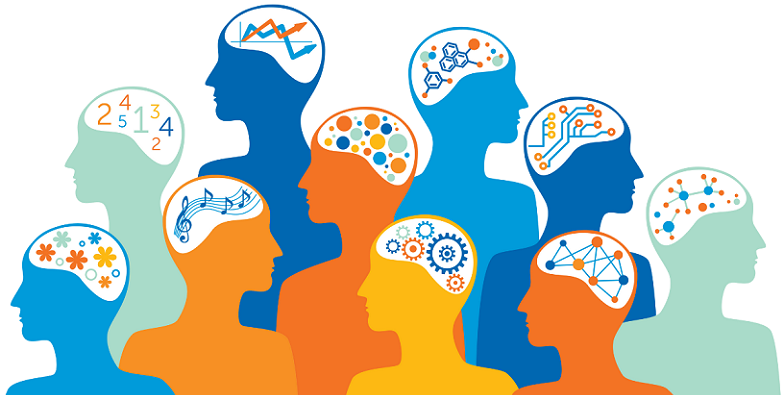Redefining Normal: Enriching Society Through Neurodiversity Inclusion
In recent years, research has made it abundantly clear that neurodiversity is far more common than we once thought. This revelation invites us to rethink our concepts of ‘normal’ and ‘typical’, and to create a more inclusive society where all cognitive styles are valued. Here we look into the world of neurodiversity, exploring the strengths of neurodivergent individuals, the challenges they currently face, and the ways in which society can better support and celebrate these unique minds.
Understanding Neurodiversity
In order to better support neurodivergent individuals, we must first deepen our understanding of neurodiversity. It’s crucial to understand what neurodiversity entails, the common conditions involved, and the unique strengths and capabilities it can bring.
Common Neurodivergent Conditions
Neurodivergent conditions are those that involve differences in brain function that affect behavior, learning, and social interaction. Some of the most common neurodivergent conditions include Autism Spectrum Disorder (ASD), Attention Deficit Hyperactivity Disorder (ADHD), Dyslexia, and Tourette Syndrome among others.
ASD, for example, can affect social interactions, communication, and behavior, but can also give rise to unique skills, such as heightened focus on specific interests. ADHD, on the other hand, is often characterized by difficulties with attention, hyperactivity, and impulsivity, but may also lead to creativity and a dynamic approach to problem-solving. Dyslexia, which affects reading and language-based processing skills, can also enhance skills in problem-solving and spatial reasoning.
Neurodiversity as a Spectrum
It’s crucial to note that neurodiversity is a spectrum. Each neurodivergent condition exists on a continuum, and individuals within these conditions also display a wide range of characteristics. For example, people with ASD can vary greatly in their abilities and needs. Some may have substantial support needs, while others live independently and have successful careers. The same holds true for all neurodivergent conditions, emphasizing the need for personalized support and understanding.
Exploring the Strengths of Neurodivergent Individuals
Neurodivergent individuals often possess unique strengths and talents that can be overlooked in a society geared towards neurotypical norms. For example, people with ADHD may exhibit remarkable creativity and adaptability, individuals with ASD can show exceptional attention to detail, and those with dyslexia often excel in visual-spatial tasks and problem-solving [1].
While it’s important to understand the challenges neurodivergent people may face, focusing solely on these aspects risks pathologizing their experience and neglecting their potential. Recognizing and celebrating these strengths helps to create a more balanced and inclusive perception of neurodivergence.

Current State of Support for Neurodivergent Individuals
Now that we’ve gained a better understanding of neurodiversity, it’s important to assess the current state of support for neurodivergent individuals. By analyzing existing mechanisms, recognizing the challenges, and evaluating societal perceptions, we can determine where improvements are needed.
Existing Support Mechanisms
Currently, several support mechanisms exist for neurodivergent individuals. These range from specialized educational programs and therapeutic interventions to legal protections against discrimination. For instance, schools may offer Individualized Education Programs (IEPs) or 504 plans for students with certain conditions, while laws such as the Americans with Disabilities Act (ADA) provide protection against discrimination in various areas of life [2].
Organizations, both government-led and private, offer resources and support services as well, including counseling, skills training, and social support networks. While these services are invaluable, their availability and effectiveness can often vary, leaving gaps in the support network.
Challenges Faced by Neurodivergent Individuals in Society
Despite existing support mechanisms, neurodivergent people often face significant challenges. These can include social stigmatization, discrimination, inadequate support services, and difficulties in education and employment. Misunderstandings and stereotypes about neurodivergent conditions can lead to exclusion or unfair treatment, which in turn can result in lower self-esteem and higher rates of mental health issues among neurodivergent individuals [3].
Moreover, the one-size-fits-all approach to education and work environments often fails to meet the unique needs of neurodivergent individuals. This can lead to underperformance and underemployment, depriving society of their potential contributions.
Evaluating Society’s Perception of Neurodivergent People
A significant aspect of the current state of support for neurodivergent individuals involves society’s perception of them. While strides have been made in increasing awareness and acceptance of neurodivergence, stereotypes and misconceptions persist. These can shape attitudes and behaviors, often leading to marginalization of neurodivergent individuals.
There is a growing need to challenge and change these perceptions, emphasizing the value and potential of neurodivergent individuals and fostering a more inclusive and understanding society.

The Need for Change: Better Support for Neurodivergent Individuals
Given the current state of affairs, it’s clear that change is necessary. Improving support for neurodivergent people isn’t just a matter of fairness; it also holds significant potential for societal growth and enrichment.
Recognizing Neurodivergent Potential and Contributions
Neurodivergent individuals often possess unique skills and perspectives that can bring significant value to a variety of sectors. Their potential for innovation, problem-solving, and creativity can enhance scientific research, technology development, artistic creation, and more. By creating an environment where neurodivergent individuals are supported and encouraged to contribute, we can tap into this untapped potential [4].
Implications of New Findings for Society
The recent revelations about the prevalence of neurodiversity underscore the need for change. It’s evident that a significant portion of our population is neurodivergent, and our societal structures need to reflect this diversity. Recognizing neurodiversity as a natural and valuable aspect of human variation, rather than a deviation from the norm, is a crucial step towards inclusivity.
The Social and Moral Imperative for Inclusive Support
Beyond the potential benefits, there is a social and moral imperative to better support neurodivergent individuals. Everyone deserves the opportunity to thrive and contribute to society, regardless of neurological differences. By fostering inclusivity, we uphold the principles of equality and human rights, and create a society that truly values all its members.

Strategies for Fostering a Neurodivergent-Inclusive Society
Having recognized the need for change, the question arises: how can we foster a society that is inclusive and supportive of neurodivergent individuals? There are several key areas where concerted efforts can make a significant difference.
Education: Normalizing Neurodiversity
Education plays a crucial role in shaping society and its perceptions. By incorporating neurodiversity into education, we can foster understanding and acceptance from an early age.
Integrating Neurodiversity into School Curriculums
Incorporating neurodiversity into school curriculums can help to normalize it. This could involve teaching about different neurodivergent conditions, highlighting the strengths and contributions of neurodivergent individuals, and promoting understanding and empathy. Furthermore, educators can be trained to recognize and support neurodivergent students, ensuring that their unique needs are met [5].
Raising Awareness Through Public Information Campaigns
Public information campaigns can also be a powerful tool for promoting understanding of neurodiversity. By debunking myths, challenging stereotypes, and showcasing the potential of neurodivergent individuals, these campaigns can shift societal perceptions and foster a more inclusive mindset.
Policy: Creating Neurodivergent-Friendly Laws
Policy is another key area where changes can promote a more neurodivergent-inclusive society.
Protection Against Discrimination
Existing anti-discrimination laws can be reviewed and strengthened to ensure they adequately protect neurodivergent people. This could involve specific protections against discrimination in areas such as employment, education, and access to services.
Promoting Equal Opportunities for Neurodivergent Individuals
Policy-makers can also focus on promoting equal opportunities for neurodivergent individuals. This could involve measures such as providing support for neurodivergent students in higher education, incentivizing employers to hire and support neurodivergent employees, and ensuring access to necessary services and supports.
Workplace: Developing Inclusive Work Environments
The workplace is another crucial area for promoting neurodivergent inclusivity.
Implementing Neurodivergent-Friendly Hiring Practices
Organizations can review their hiring practices to ensure they are inclusive of neurodivergent individuals. This could involve offering accommodations during the recruitment process, providing training for HR personnel on neurodiversity, and actively seeking to attract neurodivergent talent.
Providing On-The-Job Support and Accommodations
Once employed, neurodivergent individuals may require certain supports or accommodations to perform at their best. Employers can provide these supports, create a welcoming and understanding workplace culture, and foster an environment where neurodivergent employees are valued and included.
References
[1] Intro to Neurodiversity
[2] Understanding and Enriching Neurodiversity Hiring
[3] Embracing Neurodiversity: Have We Been Inclusive Enough?
[4] 7-Day Neurodiversity Inclusion Challenge
[5] The Neurodiversity Approach(es): What Are They and What Do They Mean for Researchers?












Recent Comments